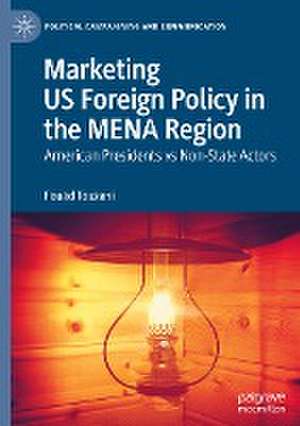Marketing US Foreign Policy in the MENA Region: American Presidents vs Non-State Actors: Political Campaigning and Communication
Autor Fouad Touzanien Limba Engleză Hardback – 30 ian 2024
Din seria Political Campaigning and Communication
-
 Preț: 152.45 lei
Preț: 152.45 lei - 20%
 Preț: 690.36 lei
Preț: 690.36 lei -
 Preț: 353.61 lei
Preț: 353.61 lei - 18%
 Preț: 729.84 lei
Preț: 729.84 lei - 15%
 Preț: 695.85 lei
Preț: 695.85 lei - 18%
 Preț: 890.37 lei
Preț: 890.37 lei - 15%
 Preț: 643.65 lei
Preț: 643.65 lei - 15%
 Preț: 586.23 lei
Preț: 586.23 lei - 18%
 Preț: 785.42 lei
Preț: 785.42 lei -
 Preț: 415.53 lei
Preț: 415.53 lei - 18%
 Preț: 780.19 lei
Preț: 780.19 lei - 18%
 Preț: 724.50 lei
Preț: 724.50 lei -
 Preț: 382.57 lei
Preț: 382.57 lei - 18%
 Preț: 890.23 lei
Preț: 890.23 lei - 18%
 Preț: 726.85 lei
Preț: 726.85 lei - 18%
 Preț: 895.58 lei
Preț: 895.58 lei -
 Preț: 390.63 lei
Preț: 390.63 lei
Preț: 725.43 lei
Preț vechi: 884.68 lei
-18% Nou
Puncte Express: 1088
Preț estimativ în valută:
138.85€ • 150.88$ • 116.71£
138.85€ • 150.88$ • 116.71£
Carte tipărită la comandă
Livrare economică 21 aprilie-05 mai
Preluare comenzi: 021 569.72.76
Specificații
ISBN-13: 9783031451423
ISBN-10: 3031451422
Pagini: 175
Ilustrații: XIII, 175 p. 8 illus.
Dimensiuni: 148 x 210 mm
Greutate: 0.38 kg
Ediția:1st ed. 2024
Editura: Springer Nature Switzerland
Colecția Palgrave Macmillan
Seria Political Campaigning and Communication
Locul publicării:Cham, Switzerland
ISBN-10: 3031451422
Pagini: 175
Ilustrații: XIII, 175 p. 8 illus.
Dimensiuni: 148 x 210 mm
Greutate: 0.38 kg
Ediția:1st ed. 2024
Editura: Springer Nature Switzerland
Colecția Palgrave Macmillan
Seria Political Campaigning and Communication
Locul publicării:Cham, Switzerland
Cuprins
Chapter 1. Introduction.- Chapter 2. The Media and US Foreign Policy in the MENA area: From the war on terror to the Arab Spring.- Chapter 3. The US Public Opinion: A Marginal Impact on US Foreign Policy.- Chapter 4. Interest Groups : An imperfect Impact.- Chapter 5. Think Tanks: A Circuitous Impact on US Foreign Policy.- Summary and conclusion.
Notă biografică
Fouad Touzani is currently the founder and director of Ibn Ghazi Arabic Institute in Morocco. He has presented many research papers in many international conferences. His research interests include foreign policy, international security and political communication.
Textul de pe ultima copertă
“This is an innovative application of a brand personality model to political marketing. It is also an in-depth examination of the impact that such a model has in a unique national polity. All in all, this is a well-designed, well-executed study that is well worth reading.”
—Ken Cosgrove, Professor of Political Science, Suffolk University, MA, Boston, USA “
How do American presidents justify their foreign policy in the Middle East in an era of hegemonic dominance? In this fascinating book, Touzani shows the answer is far more complicated than assumed. This work is impressive in its encyclopaedic scope. It is a welcome addition to any library on US foreign policy in the Middle East.”
—Sean Yom, Associate Professor of Political Science, Temple University, USA “
After establishing the theoretical foundation for his study and drawing heavily throughout on a very impressive array of secondary and other sources, Touzani effectively traces the interaction between communications media and the main issues of US foreign policy across American administrations going back to that of US President Ronald Reagan.”
—Mark Tessler, Samuel Eldersveld Collegiate Professor of Political Science, University of Michigan, USA
The book examines how US media, public opinion, interest groups and think tanks respond to US Presidents’ attempts to market their foreign policies in the MENA Region. The scope of the analysis extends from the war on terror to the so-called Arab Spring. It focuses on some case studies including the Arab-Israeli conflict and the Iran nuclear deal. The book fills a gap in the literature pertaining to analyzing US foreign policy in the MENA area from a political communication perspective rather than from IR or a political-theory angle, which remains the dominant literature. In so saying, the book will appeal to students, researchers as well as thinks tanks and policymakers.Fouad Touzani is currently the founder and director of Ibn Ghazi Arabic Institute in Morocco. He has presented many research papers in many international conferences. His research interests include foreign policy, international security and political communication.
Caracteristici
Looks at the impact of public opinion and of interest groups on US foreign policy in the MENA Region Relies on both quantitative and qualitative methods of analysis Uses agenda-setting and framing theories to explain the influence of the media
